The first Olympic Qualifier in Shanghai in Boulder&Lead is over. It was not a competition that anyone could win an Olympic ticket at, but you could lose the chance.
There are 12 Olympic tickets on offer to Male and Female athletes, which feels incredibly generous after the Qualifiers, where only the winner won a ticket. However, because some countries have already qualified athletes, there are still competitions within the country for the final Olympic spot.
Brooke Raboutou was the favourite going into the event, and she delivered, winning the female event. Lee Dohyun beat Alberto Ginés López in the male competition after both topped the final Lead route, the only top of the whole competition. Lee’s better Boulder performance pushed him ahead of Ginés López.
Erin McNeice and Luo Zhilu both continued their form from the World Cups into the Series; McNeice finished 3rd and Luo 6th. Adam Ondra appeared on the competition scene for the first time this year, finishing 3rd as he goes in search of a second Olympic ticket. Seo Chaehyun was the best of the female Lead climbers who suffered in a Boulder-heavy competition, securing second place.
All could still change in Budapest, but in a format and series that rewards consistency, it will be tough for athletes outside of the semi-finals.
Most of the Olympic tickets will be decided in the semi-final round in Budapest, similar to the Hachioji 2019 World Championship and Toulouse 2019 Olympic Qualifier, so tune in on Saturday, 22nd June, to see who will be winning the Olympic tickets.
What you need to know
- Brooke Raboutou won the event after winning the Boulder stage. She was the only athlete to top 3 boulders and got the high zone on the final coordination boulder. Seo Chaehyun came 2nd, only 6.6 points behind Raboutou, two holds on the lead route away from the win. Erin McNeice finished joint second in Boulder and Lead to finish 3rd ahead of Nonaka Miho by 0.1 points – just one attempt in the Boulder round.
- Lee Dohyun won the male Boulder&Lead competition ahead of Alberto Ginés López after they duelled throughout the competition. Ginés López won the qualification round, and Lee won the semi-final. Both topped the Lead route to push Adam Ondra, who had won the Boulder round, into third.
- The only Universality-eligible athlete in Boulder&Lead is Svana Bjarnason. She finished 47th in Boulder&Lead in Shanghai. She needs to finish in the top 36 across both events to win the Universality ticket; otherwise, it will be reassigned to the next highest athlete in the OQS.
- With 12 tickets on offer, anyone who reached the final will have put themselves in a strong position going into the next OQS in Budapest. Currently, Molly Thompson-Smith and Pan Yufei are on the edge of the bubble of the Olympic tickets.
- Replays can be found on the Olympic Channel. You will have to scroll down to find the right events. Full results are available on the IFSC or Olympics websites.
Who Could Win an Olympic Ticket?
In Shanghai and Budapest, the same athletes compete for up to 50 points towards the overall Series ranking, and the points are added together to give a total of 100. The total points from both events are used to rank athletes and decide who wins the Olympic tickets.
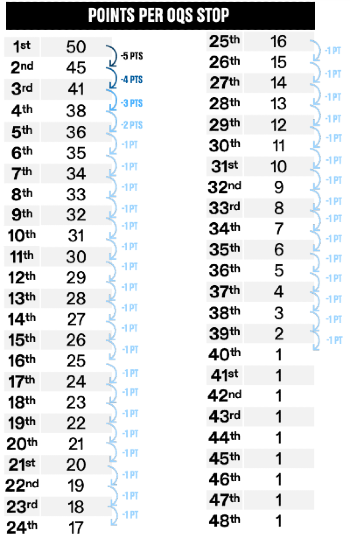
Because the Olympics wants to have a diverse selection of athletes competing, there are country quotas in climbing of two athletes per country and sex in Boulder&Lead. A country can qualify with at most 2 male athletes and 2 female athletes. The USA and Japan have both already qualified 2 Male athletes, Colin Duffy, Jesse Grupper, Sorato Anraku and Tomoa Narasaki, so no male athletes from the USA or Japan are competing in Boulder&Lead. Other countries have already qualified only one athlete, like Japan and France in Female Boulder&Lead. Athletes from these countries compete against their teammates to finish ahead of them and win an Olympic ticket. For other countries, finishing in the top 13 gave them enough points to be in an Olympic Ticket spot after Shanghai.
In Male Boulder&Lead, because each country can also only qualify at most 2 athletes to the Olympics, and France has 3 athletes in the top 20, only the top 2 will qualify. The 12 Olympic tickets, denoted by ⭐, would be distributed right now as
- Lee Dohyun (South Korea) – 50 points ⭐
- Alberto Ginés López (Spain) – 45 points ⭐
- Adam Ondra (Czechia) – 41 points ⭐
- Paul Jenft (France) – 38 points ⭐
- Sascha Lehmann (Switzerland) – 36 points ⭐
- Hannes Van Duysen (Belgium) – 35 points ⭐
- Hamish McArthur (Great Britain) – 34 points ⭐
- Sam Avezou (France) – 33 points ⭐
- Yannick Flohé (Germany) – 32 points ⭐
- Mejdi Schalck – 31 points
- Nicolas Collin (Belgium) – 30 points ⭐
- Alexander Megos (Germany) – 29 points ⭐
- Pan Yufei (China) – 28 points ⭐
- Anže Peharc (Slovenia) – 27 points
- Luka Potocar (Slovenia) – 26 points
- Nicolai Uznik (Austria) – 26 points
- Filip Schenk (Italy) – 25 points
- Stefan Scherz (Austria) – 24 points
- Stefano Ghisolfi (Italy) – 23 points
- Hannes Puman (Sweden) – 22 points
In Female Boulder&Lead, the USA, Japan, France, and Slovenia can only qualify one more athlete each. Each country can also only qualify at most 2 athletes to the Olympics. Because Svana Bjarnason is not in the top 36, the Universality ticket would be reassigned at the moment. The 12 Olympic tickets, denoted by ⭐, would be distributed right now as
- Brooke Raboutou (USA) – 50 points ⭐
- Seo Chaehyun (South Korea) – 45 points ⭐
- Erin McNeice (Great Britain) – 41 points ⭐
- Nonaka Miho (Japan) – 38 points ⭐
- Ito Futaba (Japan) – 36 points
- Jenya Kazbekova (Ukraine) – 35 points ⭐
- Luo Zhilu (China) – 34 points ⭐
- Zélia Avezou (France) – 33 points ⭐
- Camilla Moroni (Italy) – 32 points ⭐
- Lucia Dörffel (Germany) – 31 points ⭐
- Kim Jain (South Korea) – 30 points ⭐
- Mia Krampl (Slovenia) – 29 points ⭐
- Molly Thompson-Smith (Great Britain) – 28 points ⭐
- Annie Sanders (USA)– 27 points
- Manon Hily (France) – 26 points
- Franziska Sterrer (Austria) – 25 points
- Laura Rogora (Italy) – 24 points
- Lucija Tarkus (Slovenia) – 23 points
- Fanny Gibert (France) – 22 points
- Nakagawa Ryu (Japan) – 21 points
Brooke Raboutou’s win brings her finally one step closer to her second Olympics
Brooke Raboutou has been close to winning an Olympic ticket twice. At the Boulder&Lead Olympic qualification event at the 2023 World Championship in Bern, she was only 2.8 points behind Ai Mori from Japan. One more hold on the Lead route, and Raboutou would have finished third, winning an Olympic ticket.
In Santiago at the Pan American Continental Qualifier, she was second behind Natalia Grossman, 7 points behind. Had Raboutou been able to convert one of her four high zones to a third top on the Boulder stage, she could have won, winning the Olympic ticket.
She was the favourite going into the Olympic Qualifier Series to not only win a ticket but win the whole series. She has not finished outside of the top of the top 7 at a Lead, Boulder or combined Boulder&Lead event since Meiringen 2022, 24 competitions ago. She finished 3rd in the Boulder World Cup Series in both 2023 and 2022 because of her consistency.
In the final in Shanghai, she showed why she was the favourite. In a split Boulder round, the first boulder was topped by every athlete, including five flashes and the third Boulder was topped by seven of the eight finalists. Only Raboutou would make progress past the high zone on both boulders, topping the second and reaching the high zone on the fourth before falling while going for the top in the final seconds.
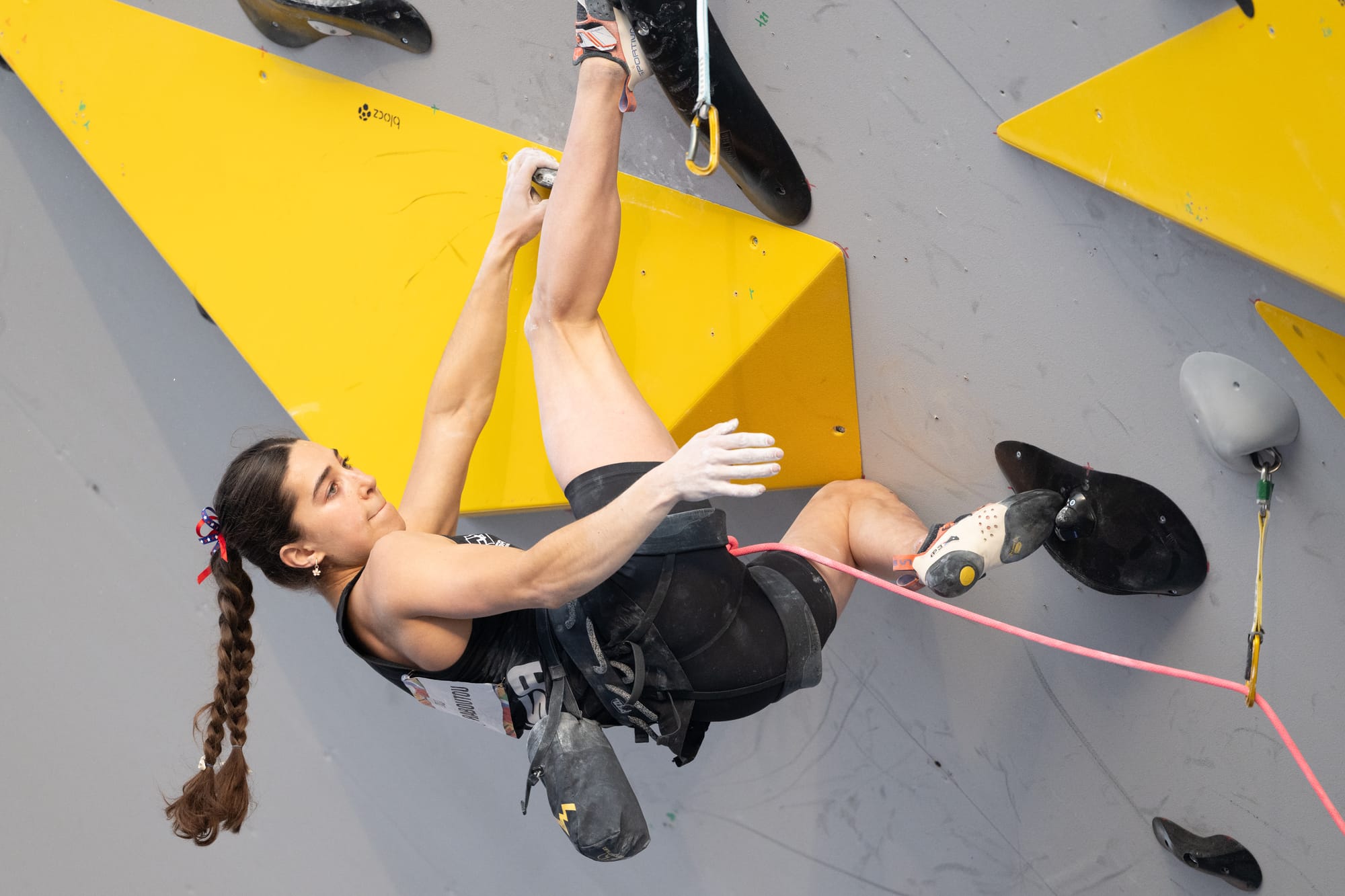
In Lead, Raboutou fell at the same point as Ito Futaba and Zélia Avezou just before the headwall on 57.1 points. Erin McNeice and Nonaka Miho both finished higher, while Seo Chaehyun won the stage with 80.1 points. Had Seo gotten 2 holds higher, she would have won. Instead, Raboutou’s additional top on Boulder 2 was the difference, winning by 6.6 points.
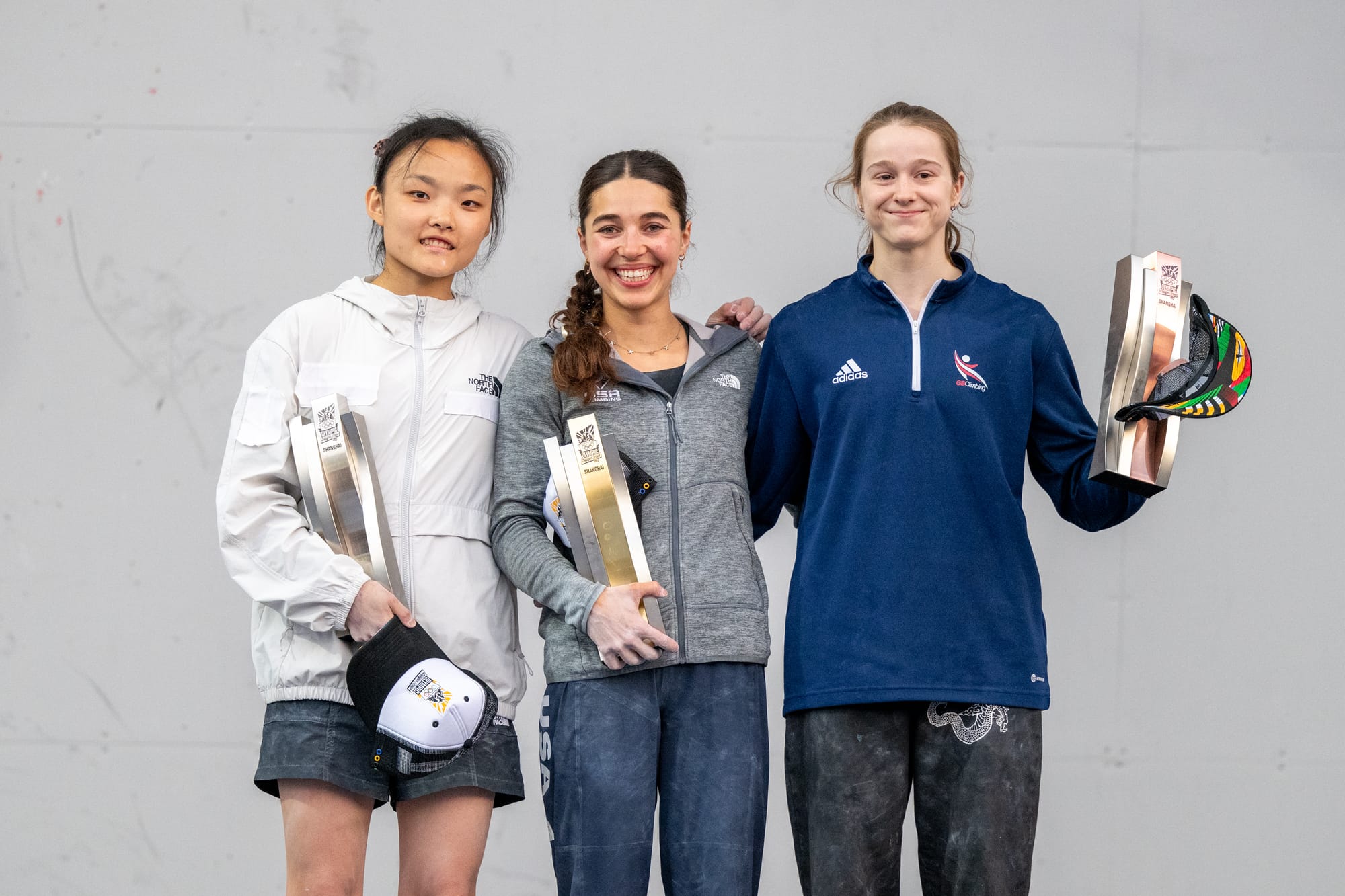
After the event, Raboutou said, “It means a lot. I have been working really, really hard. I have big goals and dreams and I was really proud of the climbing I put in today. I still feel like I have more to give which is exciting.
“I really just climbed for myself which is when I climb my best. I was able to get in a really good mindset and enjoy myself but with determination. It felt really good to try really hard and show what I am capable of.
“I went through some really hard times last year and I learned so much from them. Honestly, I am grateful for them because I feel like they are making me stronger today, both physically and especially mentally. Nobody wants the hard times and the challenging times but that’s just part of my path and journey. So, I am proud of what I am doing.”
Lee and Alberto Ginés Lopez fight for the top 2 places
Alberto Ginés López was Spain’s third gold medalist at the Tokyo 2020 Olympics, and his win came with a lot of pressure. Since his win, he has been inconsistent with his performances at competitions, sometimes doing well, like at the European Continental Championship in Munich in 2022, where he finished third in Lead and Boulder&Lead.
Other times, he fell to around 50th place, finishing 54th in Lead in Villars in 2023, 45th in Salt Lake City and 53rd in Hachioji in 2022. Bern could have been better for him, finishing outside the semi-final in Lead and Boulder, meaning he would not participate in the Boulder&Lead qualification event in Bern.
“After Tokyo 2020, I didn’t perform as well as I would have liked.” Ginés López said after the competition.”I feel like after Tokyo for a few years I didn’t get as focused as before Tokyo, now I am finally back. For Tokyo we had to focus a lot, to suffer a lot with COVID and everything and after that my mind was done. Of course some partying too didn’t help. But after Bern 2023, last year, I thought ‘Okay, if I want to go to Paris I need to focus’. Then everything changed, and I started to perform again.”
He finished third at the Koper World Cup in September, then second behind Toby Roberts at the Laval European Qualifier in October. The focus was working.
Lee Dohyun was known for his Boulder performances, winning the Prague 2023 World Cup ahead of Adam Ondra and silver medals in Innsbruck 2022 and Brixen 2023. He also won the bronze medal at the 2023 World Championship in Boulder. His best performances in Lead were 6th in Chamonix 2023 and 4th in the Bern World Championship. Lee finished 7th in Boulder&Lead at the World Championship in Bern and 3rd at the Asian Continental Qualifier in Jakarta.
In Shanghai, Ginés López would trade rounds with Lee. Ginés López won the qualification round after winning the Lead stage, while Lee won the Boulder stage in the round. Lee won the Lead stage of the semi-final to win the round ahead of Ginés López.
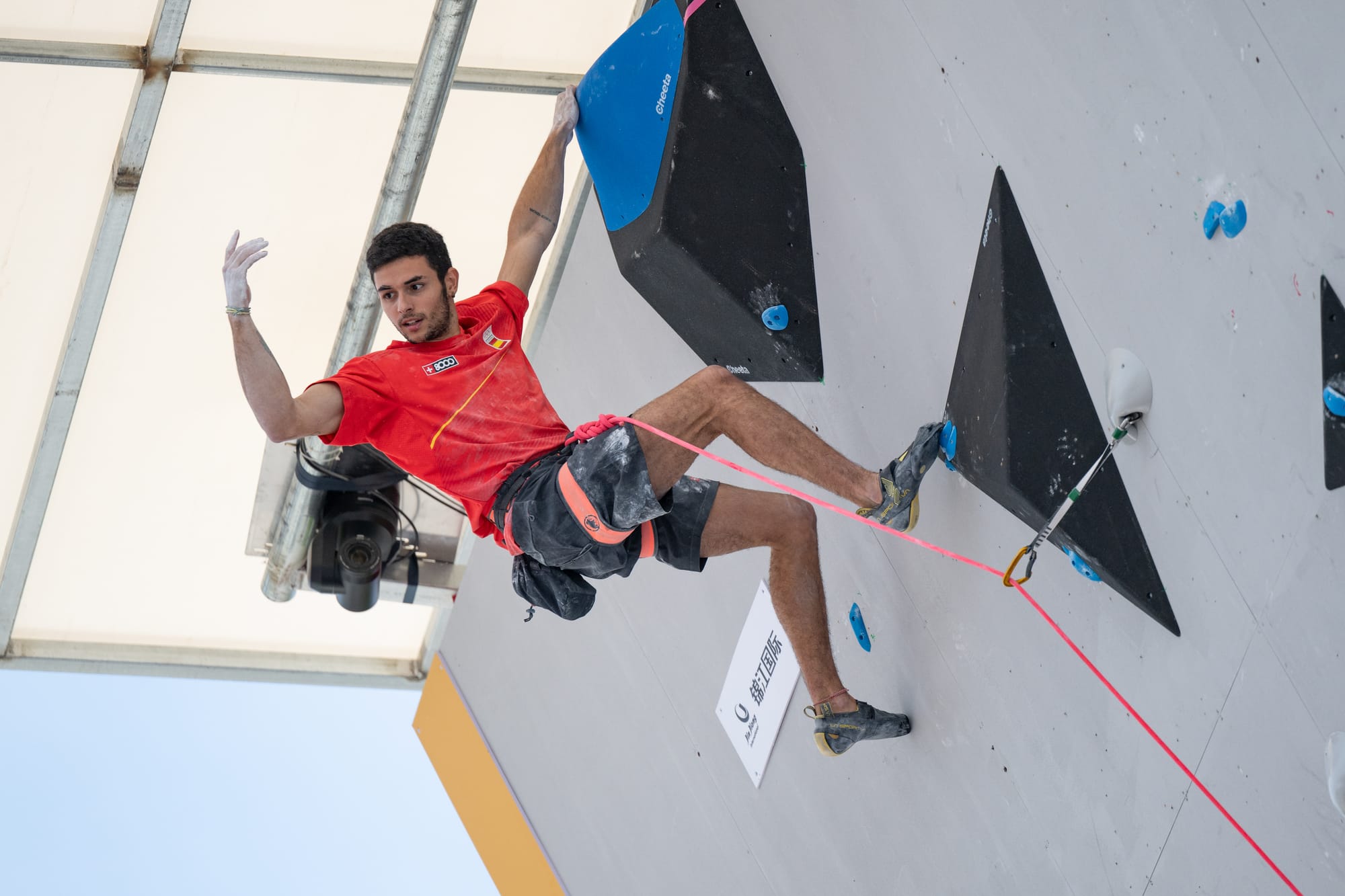
In the final, both Ginés López and Lee’s Lead performance would secure them both podium spots. The Boulder round was a hard round, with neither scoring over 35 points. Both would go on to top the Lead route, scoring the full 100 points, the only tops of the entire competition. Lee’s slightly stronger Boulder performance means he finished ahead of Ginés López by 10 points, winning the event.
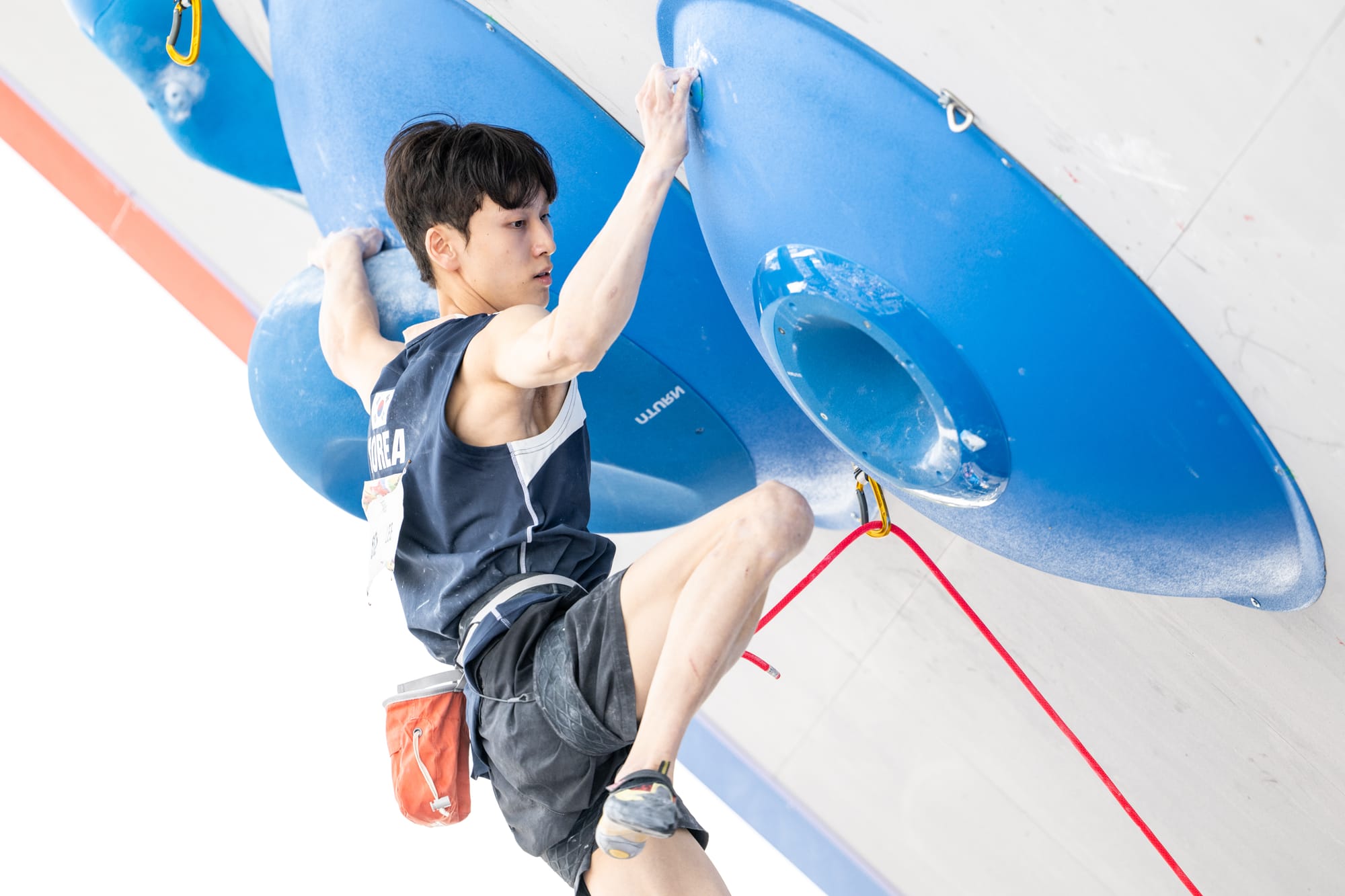
Lee would say afterwards, “Even though the Boulder results weren’t great, I wasn’t that affected. I was still confident in Lead because Lead is my main discipline. I just wanted to do what I could do but I didn’t believe I could top it.”
“I didn’t feel any pressure, but I was surprised to top the climb. I am not very expressive, I am very calm normally, but today I was emotional. I trained a lot for this and I realised what it meant.
“This is the main reason why I am climbing. For Korea, Climbing is not that big so this will tell many people about Climbing.”
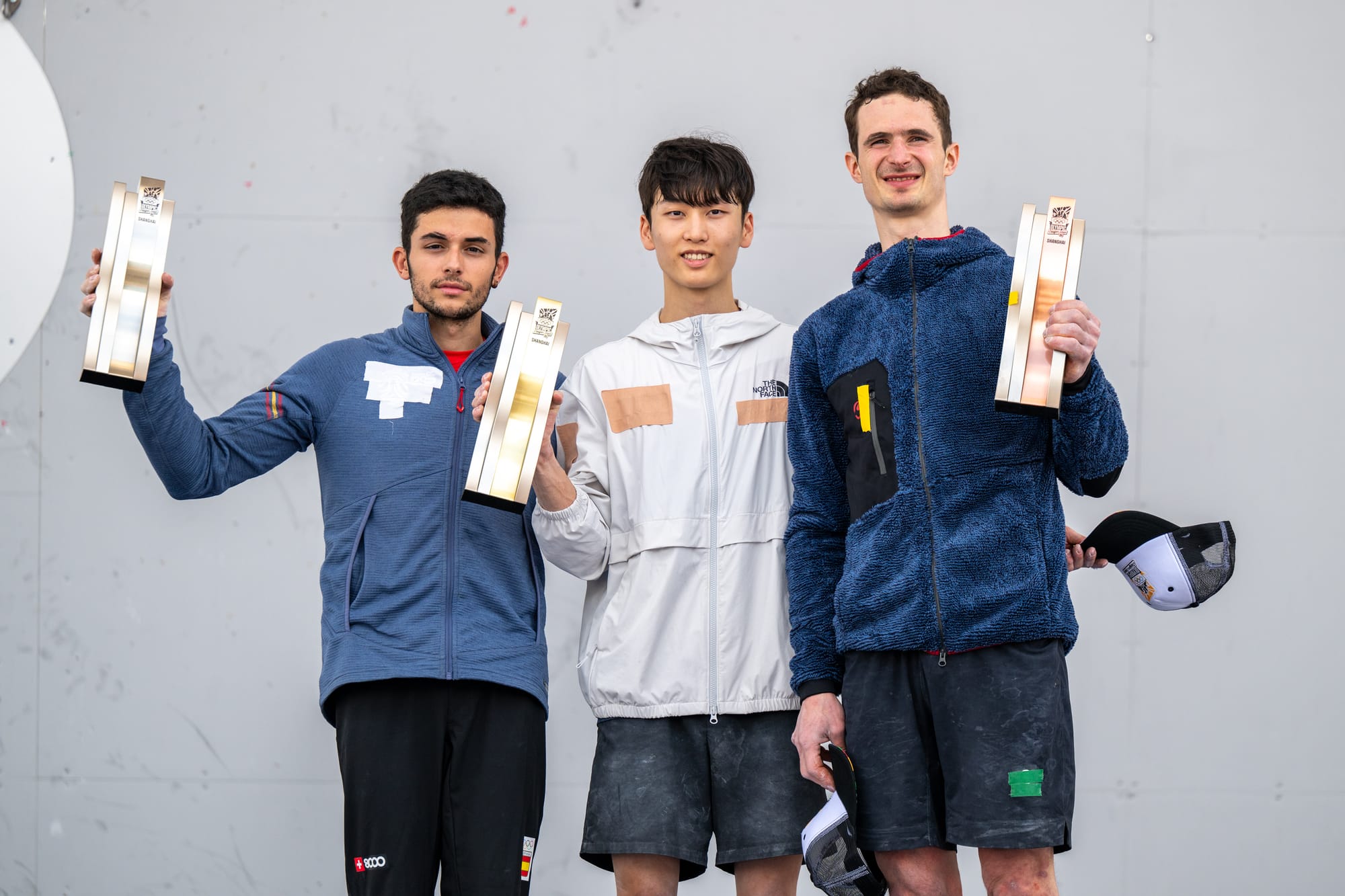
Ginés López said, “I found the flow of the route perfectly. I had this feeling like I would never fall. I just missed 15 more moves really. I could have just carried on. But the Boulder phase was hard. I was super angry when I came back to isolation, I felt like I wasn’t able to fight at all on any boulder.”
“Dohyun has improved a lot in Lead. He has for the last two years improved a lot on Boulder too. I remember meeting him for the first time in 2016. We met each other playing table tennis in our first Youth World Championships, with the Korean team. Surprisingly, the Spanish team was better than the Korean team. We didn’t expect that. But it was a tough game. Being able to compete with him this close is amazing. We are good friends, even if the language is a barrier. He is such a nice climber and super strong and such a nice guy.”
Adam Ondra’s Boulder form wins him third
Adam Ondra has always targeted the competition he competes in, and since the last Olympics, even more so. He has only competed at 6 international competitions since the Tokyo Olympics in 2021, including the World Championship in Bern and the European Continental Qualifier in Laval, where he finished 8th and 4th.
Although Ondra was the first male athlete to win both the Lead and Boulder World Cup Series back, you would characterise him as someone who favours Lead over Boulder. He has won 22 gold World Cup medals, 16 in Lead and 6 in Boulder.
However, at each of the Olympic qualification events in Bern, Laval and now Shanghai, his Lead form was below what you would have expected. In Bern, he fell below the headwall, scoring only a plus higher than Tomoa Narasaki. In Laval, Ondra was joint 3rd in Lead with Alberto Ginés López in the final behind Yannick Flohé and Toby Roberts.
In the semi-final in Shanghai, Ondra came second in the Boulder stage behind Paul Jenft and ahead of Mejdi Schalck. But in the Lead, he skipped a clip, thinking he could clip it later, and he could not. He would finish joint 7th in Lead and clearly had more to give if it wasn’t for the mistake.
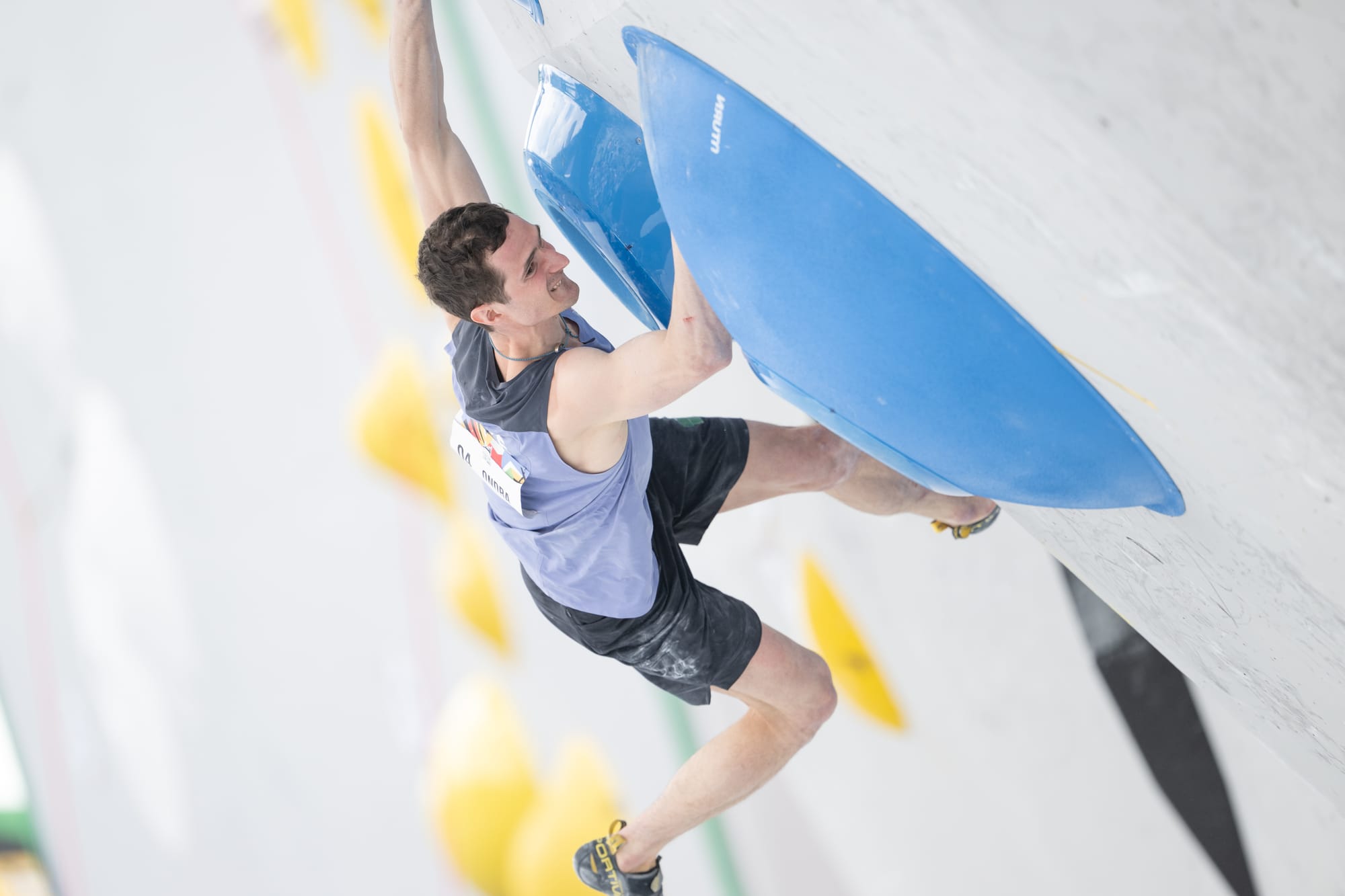
In the final, Ondra won the hard boulder stage, scoring 64 points as the only athlete to top two boulders, which saw only 5 tops across all eight athletes. In the Lead, he would finish 5th level with Hannes Van Duysen, enough to finish 3rd overall, 11 points ahead of Paul Jenft.
Ondra said after the event, “I’m pretty happy. The duty I was supposed to do, I did it, I have a really good chance to qualify. I can climb in one month in Budapest with much less stress. I am really happy with the Boulder, but I am extremely unhappy with my Lead Climbing. This was definitely the worst days of Lead in my career. So I have quite a lot of time still to reflect on that and to hopefully improve my Lead Climbing during the next month and two months, to get to the Olympics.
“I was disappointed in the previous two days as well, but maybe I wasn’t climbing my best. I think I was climbing alright today, technically, but I felt like fitness wasn’t there. I need to improve that. I was just feeling too tired to continue. I was hoping to climb a little bit higher. It’s not that painful but you really want to continue and you have nothing left in your forearms.
“I am really pleased with my Boulder performance. There’s many, many weaknesses I was able to improve and it really shows in the comps. I am also proud I was able to keep my head down and even though the two tops I did were really on the limit I was able to deliver. I am pretty happy with all the Boulder rounds I did on this competition. That gives me good confidence for the Olympics.”
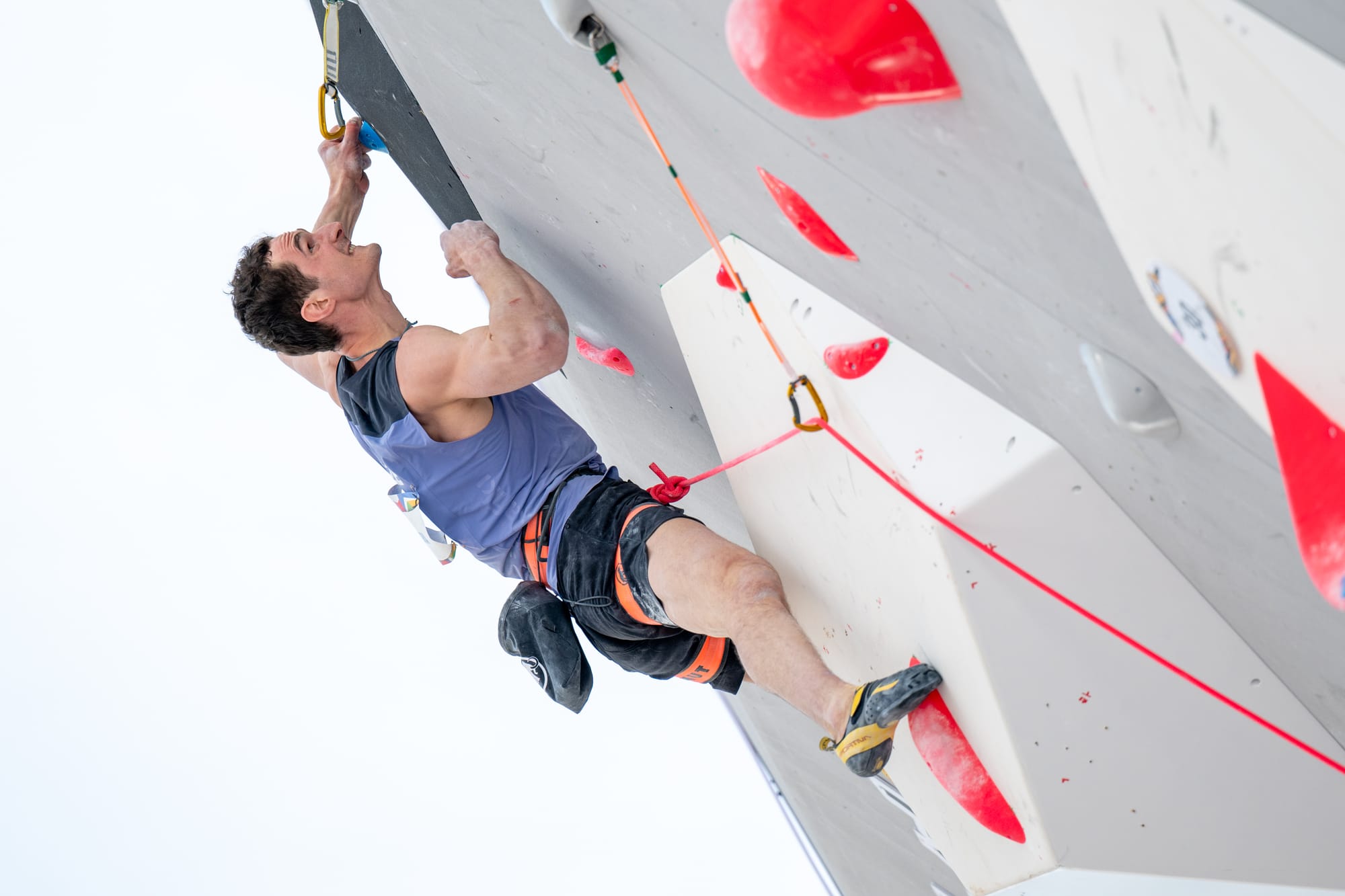
Ondra should win a second Olympic ticket in Budapest, but he has lost his dominant lead form, which is needed for the endurance-heavy combined lead routes. He now faces competition from new athletes who are clearly as good, if not better, in Lead, including Anraku Sorato, Toby Roberts, and Lee Dohyun, alongside more experienced competitors like Jakob Schubert and Tomoa Narasaki.
Ondra said “It would be amazing to have a medal from the Olympics but I know it’s really hard. Being in the shape I am right now, I literally have no chance. Definitely need to be better for Paris. Sport Climbing is changing so much it makes me a little disappointed the Olympics did not exist in climbing 10 years ago! I think I would have had a much better chance.”
Seo Chaehyun flys the flag for Lead Climbers
Shanghai was a tough competition for female lead climbers, with Seo Chaehyun being the only one to reach the final round.
She finished 25th in Boulder qualification with a score of 49.7 but managed to get 60.1 in Lead. She was one of the four semi-finalists who had scored more in Lead than Boulder alongside Laura Rogora, Molly Thompson-Smith and her compatriot, Kim Jain. While four athletes scored over 99 in boulder, the highest score in Lead was Kim’s 72, 27 points lower.

The trend of harder Lead routes than Boulder problems continued in the semi-final. Four athletes scored over 98 points in Boulder. Seo did better in Boulder in this round, finishing 8th with 79.2 points, but her fellow Lead climbers did not do as well. Both Thompson-Smith and Rogora would score around 43 points, while Kim finished last with 24.3 points. In the Lead stage, the route was hard. Kim and Manon Hily would be the only athletes to score more points in Lead than Boulder in the semi-final. Thompson-Smith would only score 30.1 and Rogora 16.1. Seo would match Kim’s high point, scoring 60.1 points in Lead. This Lead high point meant Seo won the semi-final by 3.4 points ahead of Raboutou.
In the final, Seo would flash both of the easier boulders but not so well on the other two, finishing 7th but scoring 54.2 points. In Lead, she was clearly the strongest. When she reached the headwall where everyone else had fallen by, she still looked like she had plenty to give, able to rest on holds that others fell on. Seo would make it deep into the headwall, falling going for the 4th hold from the top. When she came down, she still looked like she had more energy. She was only two holds away from taking the win.
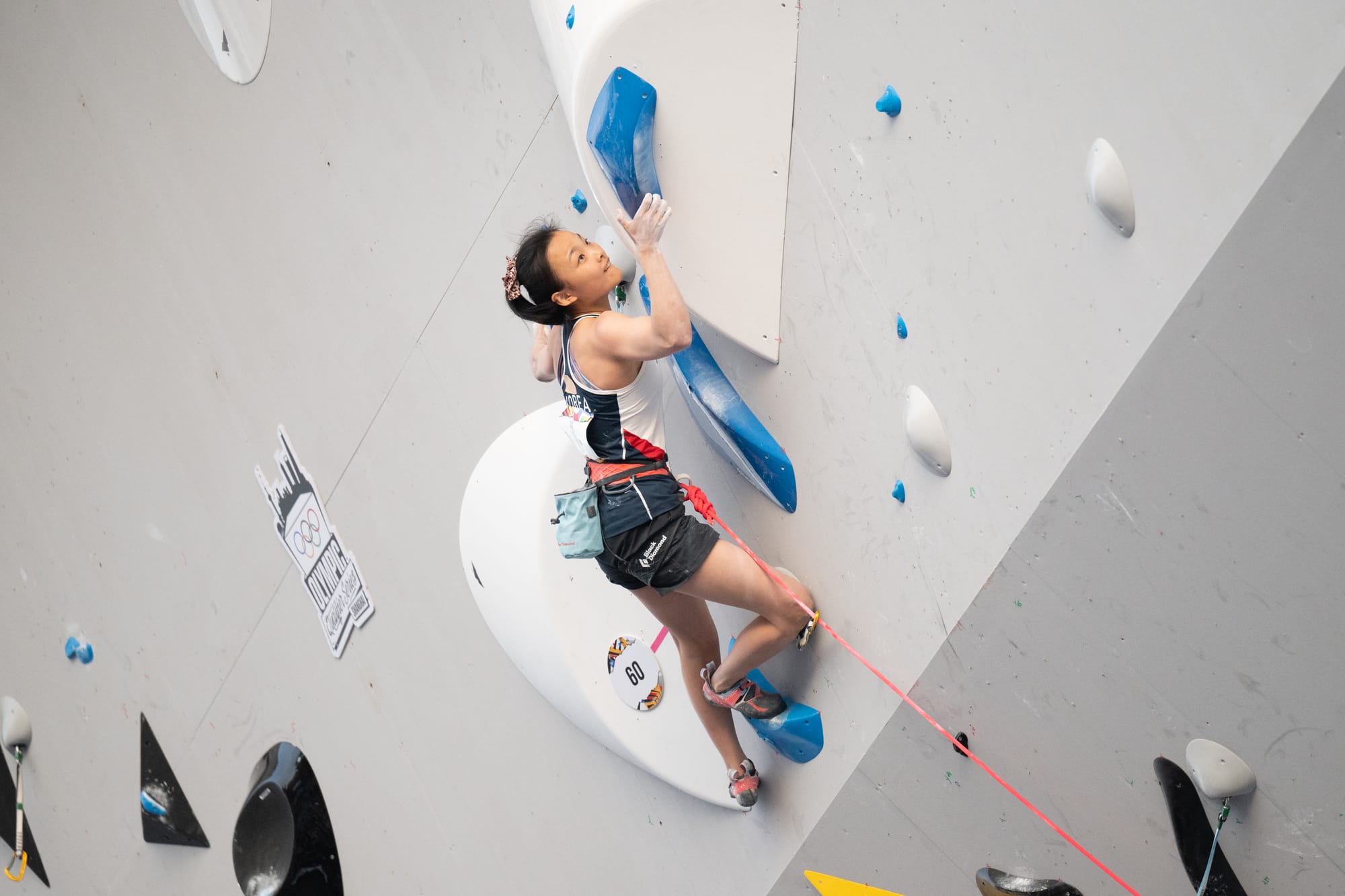
After the event, she commented, “It’s a good day for Korea. I was encouraged by my teammate Lee, I enjoyed watching the video of his final with him. I have courage now for the next stage.
“I wanted to top the Lead route like Dohyun, but it’s a pity for me. I felt quite great on the wall. I was comfortable before the fall but I felt like I was a little bit stuck on the route. It was hard but I had quite a lot of fun.”
Erin “McBeast” McNeice wins her first international medal
Before 2024, Erin McNeice would only be known to you if you were paying close attention to the British competition scene. She dominated the 2023 CWIF, beating Jenya Kazbekova and Chloé Caulier, but on the World Cup circuit, she was still finding her way as she moved from Youth to Open. A string of results in the 20s to 50s, along with a Boulder career high of 17th in Seoul, was enough to get her enough points to squeak into the OQS as 50th in the OQS Boulder&Lead ranking. She finished 18th in Laval at the European Qualifier later in the year.
At the start of the year, something was different. At the first two World Cups in China, she reached her first final in Boulder and Lead, finishing 5th in both events. People were now starting to think of her as a contender for an Olympic ticket.
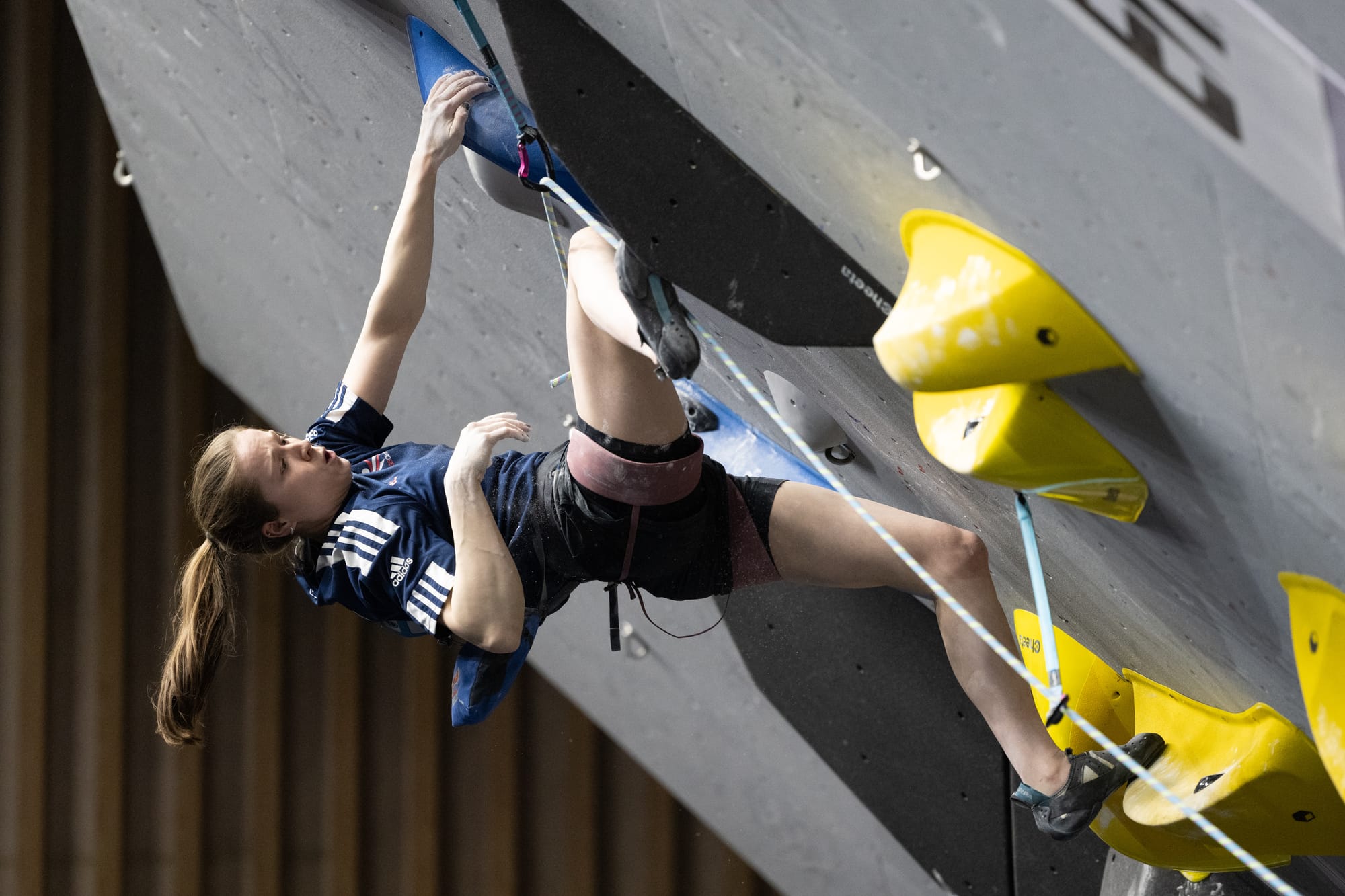
She commented after the event. “There was definitely a mindset shift in the off-season. It works for me a lot better than what I was doing before. Also, the off-season was sort of miserable in a way. It was seven to nine hours a day working on what I needed to, but it has paid off well. I worked a lot on my climbing, but also a lot of gym work. I wasn’t strong enough and it takes a long time and a lot of hours to improve that sort of stuff.
“There were times where, it’s embarrassing, but where I just broke down in training sessions. My family had to get me through that. It was just being miserable at times. I think, that time as well, I didn’t truly believe that I could make it to this. But now that I have the belief, it’ll be a lot easier.”
At the Shanghai OQS, McNeice started in 36 seed. She would finish in the top 10 in Lead and Boulder in qualifications. She would make the most of a high-scoring Boulder round in the semi-finals, finishing 6th. The Lead round was low scoring, and McNeice managed to make it far enough to finish 8th overall, 6.7 points ahead of Camilla Moroni.
In the final, having McNeice come out first in the Boulder round was disconcerting for the audience, as she flashed boulders one and three, leaving the audience unsure of how difficult the boulders would be. She would quickly get the low zones on the other two boulders, giving her 59.7 points, finishing joint 2nd in the Boulder round with local favourite Luo Zhilu. In the Lead, she would have an outstanding performance, climbing into the final section of high-scoring holds. McNeice would again finish joint second, this time tied with Nonaka Miho on 68.1 points. Both of these performances were enough for her to finish 3rd overall by 0.1 points ahead of Nonaka.
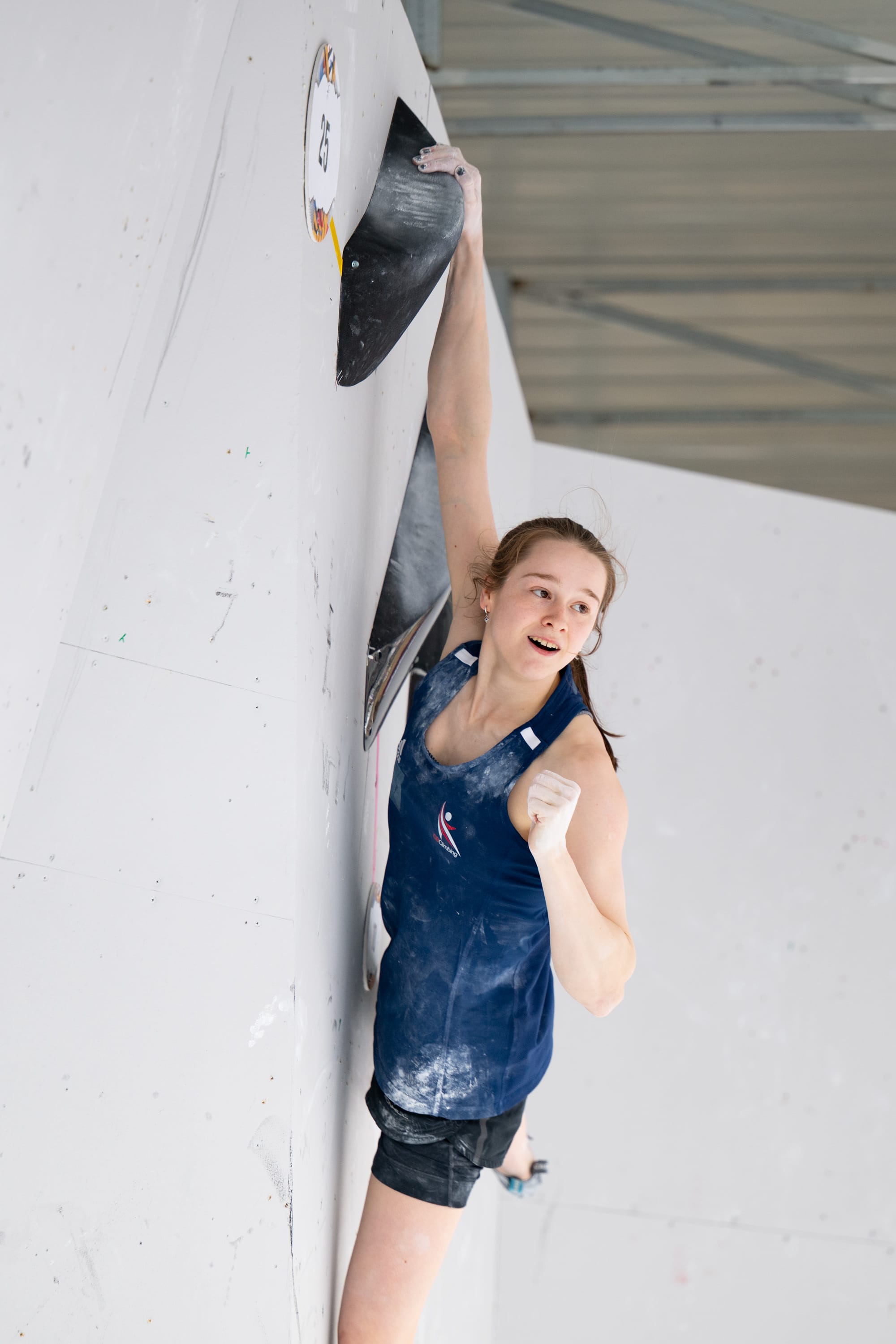
“If you had told me a year ago that I would be on the podium at the OQS, I would have said that you were lying.” She commented afterwards.” I would definitely not have believed you. It feels so crazy to be on this stage and feel competent. The China World Cups last month showed me that I have the ability to be comfortable and this has just reinforced that.
“I think the aim was always to get into the top 10 for this throughout the winter. But now I would love to get a World Cup podium and stuff like that.
“I think my family were joking about me getting my first international medal here in Shanghai, because I never got an international medal, even in youth. It’s ridiculous that my first one is here.”
For every winner in sport, there must be a loser
While some did well in Shanghai, others saw their chances of an Olympic ticket slip away. Anyone in the top half of the field still has a chance of an Olympic ticket, with 12 tickets potentially on off and only 1 point separating athletes from 5th down to 41st.
Staša Gejo, Chloé Caulier, Vita Lukan, Simon Lorenzi and Jongwon Chon are all around the midway mark. With the country quota, they are only 4–5 points behind the 12th Olympic ticket, so they have a chance to make up the difference in Budapest.
For those in the bottom half, the reality is much harder. Hannah Meul, Ayala Kerem, Max Milne, and Mickaël Mawem all finished in the bottom half of the field. As did Tokyo Olympians Sean McColl, Kyra Condie, Petra Klinger, and Alannah Yip. They will need a lot of luck and an incredible performance in Budapest to move into an Olympic ticket place.
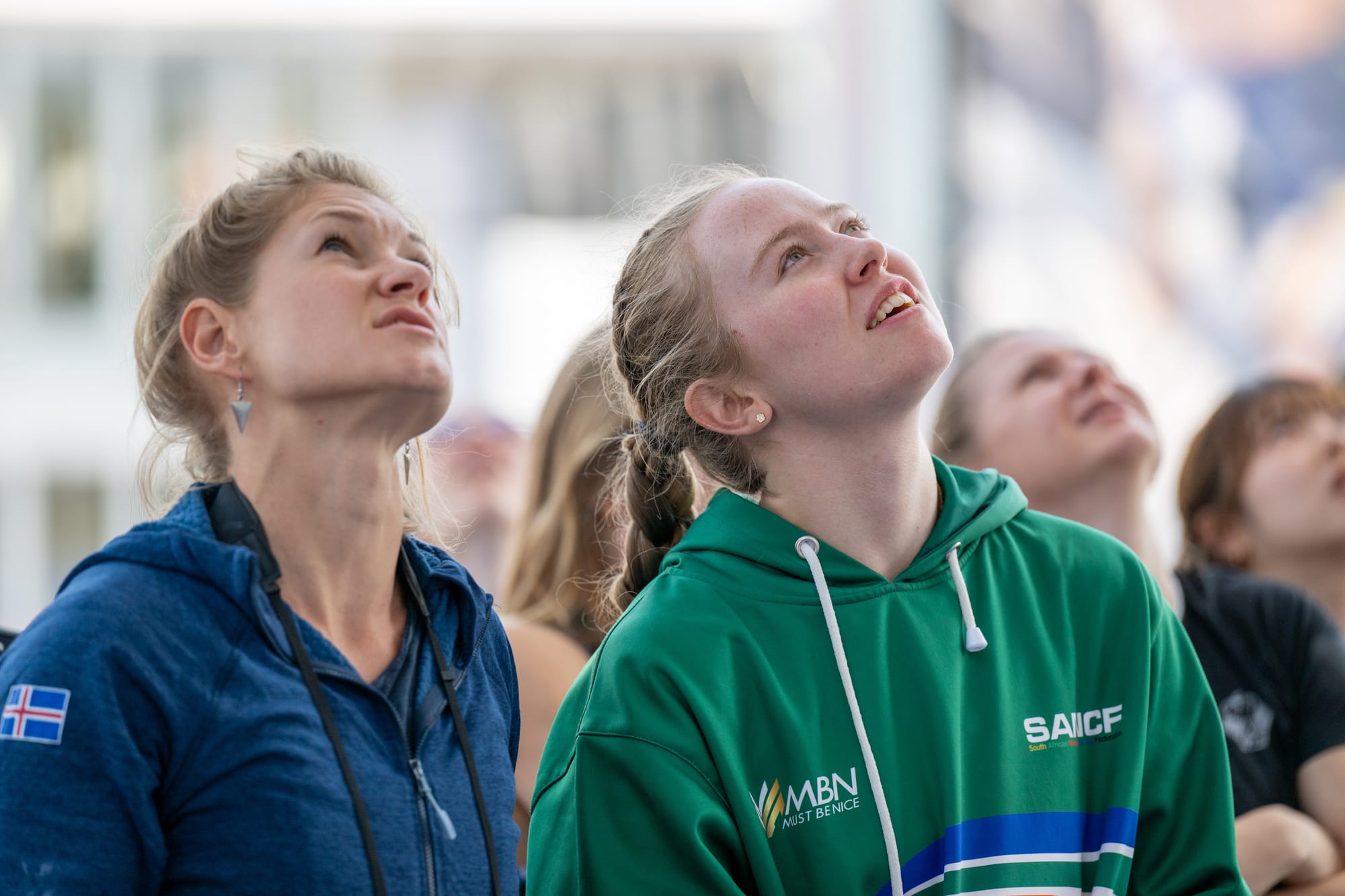
Both Svana Bjarnason and Tegwen Oates struggled in both disciplines in Shanghai, finishing 47th and 48th with 22.0 and 3.1 points. Bjaranson needs to finish in the top 36 over the series to win the Universality Olympic ticket; 36th in Shanghai scored 63.2 points. Although she can technically get into the top 36, it is an uphill battle.
Nakagawa Ryu injured her knee during the Lead qualifications, so she didn’t compete in the semi-finals. She will be looking to recover and compete in Budapest. However, she will need to finish ahead of Nonaka Miho and Ito Futaba to win an Olympic ticket. Jan Luca Posch had to skip the event after injuring his knee at the Salt Lake City World Cup and will miss the chance to compete for a ticket.





